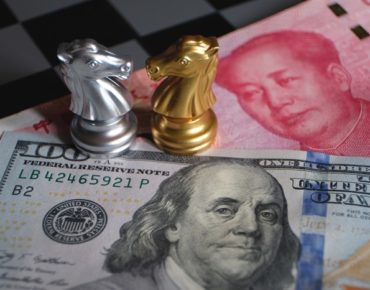China’s Coming Crypto Yuan and the Digital Disruption of Banking, for Starters

Even as China signed an agreement with the U.S. this week billed as a step toward reducing trade tensions, it’s unlikely the signing ceremony heralds a new era of détente between the two economic, military and technological superpowers. Assuming the agreement brings calm to the US-China trade war, no doubt the geopolitical clash will continue by other means.
One area of conflict, AI, is a long, high-stakes twilight struggle between the two nations. Shorter term, currency may be about to flare up, with major implications for the digital transformation of business, trade and monetary activity.
According to a recent insight article by Bloomberg’s Andy Mukherjee, China is on the brink of issuing a crypto yuan, a blockchain-based national digital currency backed by the central bank of the People’s Republic of China. This could change “banking as we know it,” to quote the Bloomberg headline, and the implications extend far beyond that. Broad acceptance of a crypto yuan could significantly disrupt the global system of floating exchange rates, undermine the place of the US dollar at the center of that system, weaken the U.S.’s ability to sanction countries regarded as bad actors on the world stage, elevate the economic position of China and its friends and enable the PRC to track and control who is transacting what business and who receives loans.
 “
“ If the central bank wants to see who’s spending where, it can,” wrote Mukherjee. “Anonymity disappears when cash does. While that will make life difficult for money launderers and terrorists, it could also become a tool to punish political activism. Meanwhile, currency as a foreign policy weapon loses some sting. Pariah states will covet a crypto they can access by circumventing banks that are terrified of flouting Western sanctions.”
If the central bank wants to see who’s spending where, it can,” wrote Mukherjee. “Anonymity disappears when cash does. While that will make life difficult for money launderers and terrorists, it could also become a tool to punish political activism. Meanwhile, currency as a foreign policy weapon loses some sting. Pariah states will covet a crypto they can access by circumventing banks that are terrified of flouting Western sanctions.”
China has for several years given indications it’s pursuing a digital yuan, but to date most cryptocurrencies have remained outside the purview of national governments – even as Bitcoin and its ilk are increasingly adopted, often in the form of enterprise blockchains or private blockchains used by a group of allied companies, for monetary transactions and other business dealings.
Tokens such as JP Morgan’s JPM Coin, launched last February, along with the major cryptocurrencies, are used for interbank transfers to save time and money. Money is converted to tokens, transferred and then converted back to money (accompanies by scrupulous bookkeeping, to avoid the whiff of money laundering).
Not backed by national currencies, cryptocurrencies fluctuate wildly in value – antithetical to the international trading system’s permanent craving for currency stability. Hence the emergence of digital currency in government-backed form. But what does it mean when a country, China, a dictatorship, the world’s second largest economy, that only this week (as part of the American trade deal) was removed from the U.S. list of currency manipulators, issues a digital currency with the potential to impact global business transactions?
According to the Bloomberg article, while details of the token yuan are not known it is generally believed it will be much like Bitcoin, a peer-to-peer blockchain for validating transaction “with the People’s Bank of China in control of who gets to participate.” Sanford C. Bernstein & Co. fintech analyst Gautam Chhugani is quoted saying that for China, “blockchain and the yuan digital currency are a national strategic priority — almost at the level of the internet.”
While the financial services industry and international monetary system are, like all other sectors, undergoing digital transformation, the proximate spur to China’s crypto move appears to have been Facebook’s stillborn (as of now) announcement last June of its Libra digital currency, which seems to have awakened governments to the potential power of non-state actors with global reach on the currency stage. As reported by Bloomberg, it "may be that technological progress is making the status quo untenable. It’s no coincidence that China hastened its national cryptocurrency after Facebook Inc. announced the Libra project, which was touted as an alternative dollar. Perhaps that was fanciful, and the Libra has hit a wall of regulatory concerns. But if they’re offered like Spotify gift cards at the local 7-Eleven, there will be demand for tokens that are acceptable across borders, stable in value against baskets of national currencies, and can be used in global trade and investing.”
Shahin Khan*, founding partner at technology consultants OrionX.net, agrees Libra is directly related to a pending crypto yuan.
 “New technologies typically are known to disrupt markets and companies,” Khan said, “but with blockchain and cryptocurrency we have a technology that can disrupt governments, too. And that is really new because until now, if the government didn't use a technology then they might be a little less efficient, it wouldn't see it as a threat that it wasn't adopting it. Now, this was all brought to the front and center last year when Facebook announced their plans for Libra. And currencies, of course, have needed the assurance that governments can provide. And over time, currencies have become perceived as an important part of a nation's sovereignty. Cryptocurrencies challenge that notion. So the whole area is a big deal with big technical, political and global implications.”
“New technologies typically are known to disrupt markets and companies,” Khan said, “but with blockchain and cryptocurrency we have a technology that can disrupt governments, too. And that is really new because until now, if the government didn't use a technology then they might be a little less efficient, it wouldn't see it as a threat that it wasn't adopting it. Now, this was all brought to the front and center last year when Facebook announced their plans for Libra. And currencies, of course, have needed the assurance that governments can provide. And over time, currencies have become perceived as an important part of a nation's sovereignty. Cryptocurrencies challenge that notion. So the whole area is a big deal with big technical, political and global implications.”
Crypto money also could drive major AI-related developments.
“When you apply AI to transaction data, that really is when cryptocurrencies and blockchain and data and AI come together,” said Khan. “The other thing that blockchain can do is to provide some level of assurance that the data you're using is valid data. And it turns out that when you have valid, structured data, your AI can be faster, it can be cheaper, it can be more efficient, because when the data that arrives it is kind of AI ready. And certainly blockchain technologies can serve that purpose while they're doing their own thing.”
Khan also said that for all the concerns regarding a PRC-backed crypto currency, it will have to overcome major hurdles to reach global prominence.
“Mass adoption means that you have to eliminate complexity and remove the need for deep expertise by end users,” he said. “And the more you appeal to consumers, the more that needs to be the case. So that means the software abstraction needs to be there, at least for the main layers, for the ledger, for consensus algorithms, for custody, wallets, smart contracts, just for day to day use. And so cryptocurrencies are going to be competing with things like Apple Pay and Google Pay and all these others that are relatively easy to use. So it's not guaranteed that simply having a government backed currency is going to make it successful. Even within the country, you need to get it right. Now if you are able to compel your population to use it that helps. But it's a product at the end of the day, and just like any other product, it needs to be competitive.”
* Shahin Khan will be a featured speaker at Tabor Communications' HPC & AI on Wall Street conference in Singapore, April 14 and 15. He will host a panel discussion entitled Blockchain and Crypto Innovations in Financial Services.










